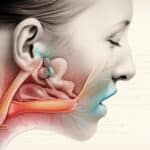Tinnitus Unveiled: Why Your Ears Ring and How to Silence the Sound
- Get link
- X
- Other Apps
Introduction
Walking under a ladder? Seven years of bad luck. Black cat crossing your path? That’s an omen. Ringing in your ear? You may be suffering from Tinnitus! This medical condition is far from a folktale; it’s a reality that many individuals experience. Let’s dig deeper and understand this mysterious phenomenon of ear ringing.
Common Causes of Ear Ringing
Tinnitus often boils down to ‘phantom sounds’ that seem to be playing on an endless loop; only you can hear this soundtrack. For a deeper dive into this condition, check out this article on Understanding Tinnitus.
But what causes it? Do seasonal allergies have an encore on this stage of ear ringing? For some, the answer could be yes! Allergies causing Tinnitus are not an unheard-of concept, with allergy-induced inflammation potentially contributing to Eustachian tube blockages, leading to Tinnitus.
Speaking of the Eustachian tube, dysfunction of this essential anatomical ear element could cause a symphony of symptoms including frequent ear infections, hearing loss, and of course, Tinnitus. Learn more about Tinnitus from Eustachian Tube Dysfunction.
Symptoms for Tinnitus
The presence of an ear infection can also be a conductor leading to the concert of Tinnitus. An infection often causes inflammation in various parts of the ear, which might interfere with our ability to hear external sounds. But it can also create internal noise, leading to Tinnitus. Check out Ear Infection causing Tinnitus to understand more.
Can’t help but wonder, “Will this ringing ever stop?” Guess what? Your Tinnitus might be dimming its own lights. You just need to identify the Signs That Tinnitus Is Going Away. Identifying diminishing Tinnitus might be the highlight of your journey to understand and manage your Tinnitus condition.
Remember to always consult with a qualified healthcare provider or your [trusted medical source] for personalized medical advice.
Stay tuned for more insights on Tinnitus in our forthcoming sections!
Different Kinds of Tinnitus
Like an intricate musical piece, Tinnitus isn’t just one tune—it is presented in several different compositions. Take, for instance, the unique interplay between White Noise and Tinnitus. Ever tuned into the fuzzy static noise from an untuned radio or TV? Now imagine your ears playing a similar kind of static—welcome to the world of white noise-induced Tinnitus!
Can feel your heart pulsate in your ears you ask? If it’s in tune with the steady rhythm of your own heartbeat, it might be indicative of Pulsatile Tinnitus. One potential conductor of this rhythm? Your blood pressure. Given the body’s intricate network of intimate connections, it’s no surprise that high blood pressure could lead to a symphony of symptoms, including ear ringing.
Effects of Lifestyle on Ear Ringing
Is your tinnitus a chronic problem, or can it simply fade away? Will lifestyle changes make a difference? Does Tinnitus Go Away? Get the answer in this dedicated article that delves into the long-term prognosis of tinnitus.
Did you know that certain life events could trigger or exacerbate tinnitus? Notably, pregnancy can be a significant factor. There’s a unique connection between Tinnitus during Pregnancy. But remember, always consult with a healthcare expert – you can find reliable health advice from [Healthline].
How to Manage Ear Ringing
Ready for some good news? There are possibilities to manage your Tinnitus! A popular supplement, Lipo-Flavonoid, is often recommended as potential relief from ear ringing. Explore more at Lipo-Flavonoid Tinnitus.
But, remember, Tinnitus isn’t a condition you should self-diagnose or manage. If the ringing in your ears is causing concern, it’s crucial to get a specialist’s opinion. If you’re unsure where to look, Best Doctor for Tinnitus is a complete guide that will help you direct your concerns to the right door. Always make sure your healthcare provider aligns with trusted healthcare resources, like [WebMD].
Managing the daily echo of Tinnitus requires understanding—knowing its tunes, notes, and conductors. As we journey further, we’ll decode more aspects of Tinnitus, so stay tuned!
Preventing Tinnitus
Given an option, wouldn’t we all love to simply sweep Tinnitus out of our lives? That’s where prevention comes into play! But, “How can we prevent Tinnitus?” you ask, and rightly so. Embark on your preventive journey with this guide to Tinnitus Prevention.
It’s not just about dodging possible triggers or adopting healthy ear habits—remember, every aspect of your lifestyle has key roles to play.
Take sleep, for instance. We all cherish those sweet moments of repose, but for those dealing with Tinnitus, it’s even more crucial. Is there a correlation between lack of sleep and Tinnitus? Does sleeplessness aggravate or mitigate Tinnitus symptoms? Get an understanding of the relationship between Lack of Sleep and Tinnitus.
If you’re trying to catch some z’s but Tinnitus is blocking you, don’t give up. Consult with a healthcare expert and explore [trusted medical resources].
Conclusion
And that’s a wrap for our deep dive into understanding Tinnitus—a condition that makes itself heard through the unending echoes of ear ringing. While the causes of Tinnitus can range from infections to allergies to lifestyle issues, we trust that this article has helped you understand the complex orchestra that plays behind this condition.
Remember, Tinnitus is not just about managing symptoms. It’s about understanding its nuances, its triggers, and its prevention. While medical assistance remains a crucial factor, ultimately, your personal exploration and understanding of your condition will lead you toward effective management and prevention.
Following these points, alongside reliable medical advice, is a step in the right direction to triumph over Tinnitus’s unwelcome symphony. Are you ready to regain your peace and silence? Here’s to a life tuned toward wellness, without the unwanted interruptions of Tinnitus!
Reasons For Ear Ringing - Frequently Asked Questions (FAQ)
Ear ringing or Tinnitus can be caused by a variety of factors, including exposure to loud noises, earwax blockage, changes in the ear bones, age-related hearing loss, Meniere’s disease, TMJ disorders, inner ear damage from medication or head or neck injuries. Besides these, lifestyle choices like smoking and alcohol can also contribute to causing ear ringing.
Yes, ear ringing can be a symptom of several underlying conditions like blood pressure problems, allergies, and certain neurological disorders. Even stress and fatigue can worsen tinnitus. It’s always recommended to consult with a healthcare provider if the ringing persists.
Certain treatments can help alleviate Tinnitus, depending on the underlying cause. These might include wax removal, changing medications or using certain devices to mute the ringing sound. However, the effectiveness of the treatment can vary based on individual cases and should always be done under medical supervision.
Yes, lifestyle modifications like avoiding exposure to loud noise, reducing alcohol and caffeine consumption, practicing stress management and relaxation techniques can help manage Tinnitus symptoms.
Yes, lack of sleep and Tinnitus often form a vicious cycle where the ringing worsens due to tiredness and the noise keeps the individual from sleeping comfortably. Proper sleep hygiene can help manage Tinnitus symptoms.
The post Tinnitus Unveiled: Why Your Ears Ring and How to Silence the Sound appeared first on Pulsatile Tinnitus Treatments News - Tinnitus Relief.
Related posts:
https://ift.tt/ITkBtCU
#tinnitus #pusatiletinnitus #earringing #whatistinnitus #howtostoptinnitus
- Get link
- X
- Other Apps



Comments
Post a Comment